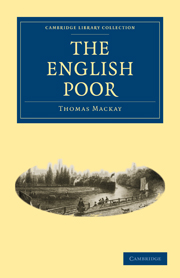Book contents
- Frontmatter
- PREFACE
- Contents
- CHAPTER I PROPERTY THE MAIN CONDITION OF SURVIVAL. THE GENERAL PROPOSITION STATED
- CHAPTER II THE SAME CONSIDERED HISTORICALLY. PRIMITIVE FORMS OF SOCIETY AND THE VILLAGE COMMUNITY
- CHAPTER III ENGLISH VILLENAGE
- CHAPTER IV THE BLACK DEATH AND THE DIVORCE OF THE LABOURER FROM THE LAND
- CHAPTER V THE INCREASE OF SHEER-FARMING, AND THE GROWTH OF A PROLETARIATE
- CHAPTER VI TOWN LIFE AND THE TRADE GILDS
- CHAPTER VII SOCIAL LEGISLATION AND THE POOR LAW
- CHAPTER VIII THE INDUSTRIAL REVOLUTION OF THE EIGHTEENTH CENTURY
- CHAPTER IX THE THEORY OF WAGES
- CHAPTER X PRIVATE PROPERTY AND POPULATION
- CHAPTER XI THE MODERN ASPECT OF THE POOR LAW
- CHAPTER XII THE POOR LAW, continued
- CHAPTER XIII INSURANCE A SUBSTITUTE FOR THE POOR LAW
- CHAPTER XIV SOME FORMS OF SOCIALISTIC LEGISLATION
- CHAPTER XV THE ETHICAL ASPECT OF THE QUESTION
CHAPTER III - ENGLISH VILLENAGE
Published online by Cambridge University Press: 29 August 2010
- Frontmatter
- PREFACE
- Contents
- CHAPTER I PROPERTY THE MAIN CONDITION OF SURVIVAL. THE GENERAL PROPOSITION STATED
- CHAPTER II THE SAME CONSIDERED HISTORICALLY. PRIMITIVE FORMS OF SOCIETY AND THE VILLAGE COMMUNITY
- CHAPTER III ENGLISH VILLENAGE
- CHAPTER IV THE BLACK DEATH AND THE DIVORCE OF THE LABOURER FROM THE LAND
- CHAPTER V THE INCREASE OF SHEER-FARMING, AND THE GROWTH OF A PROLETARIATE
- CHAPTER VI TOWN LIFE AND THE TRADE GILDS
- CHAPTER VII SOCIAL LEGISLATION AND THE POOR LAW
- CHAPTER VIII THE INDUSTRIAL REVOLUTION OF THE EIGHTEENTH CENTURY
- CHAPTER IX THE THEORY OF WAGES
- CHAPTER X PRIVATE PROPERTY AND POPULATION
- CHAPTER XI THE MODERN ASPECT OF THE POOR LAW
- CHAPTER XII THE POOR LAW, continued
- CHAPTER XIII INSURANCE A SUBSTITUTE FOR THE POOR LAW
- CHAPTER XIV SOME FORMS OF SOCIALISTIC LEGISLATION
- CHAPTER XV THE ETHICAL ASPECT OF THE QUESTION
Summary
It would be presumptuous in one who is not a specialist to attempt any new reading of English history. Happily, in the subject now under consideration, there is a very general agreement as to facts. The difficulty lies in the interpretation of these facts. Some consensus of opinion has described the fifteenth century as the golden age of the English labourer. One is naturally inclined to distrust the glowing pictures of a prosperous past, which are too often drawn by pessimists as a ground for the disparagement of their own times. The golden age of such writers is too often found to be a mere ignis fatuus, which vanishes when we attempt to examine it at close quarters. Indeed, there is nothing about which men differ more than in an attempt to estimate the amount of prosperity which exists in any given community. This is a subject about which contemporaries cannot agree. Everyone who has considered the question must feel that, when attempting to gauge the happiness of bygone generations, he is dealing with facts which are very ill ascertained and very liable to error.
There is no need to dispute the characteristics which have been ascribed to the position of the labourer in the fifteenth century. The statement must, however, be considered relatively to the position of the rest of the population. It is very possible that the condition of the labourer approached nearer to the condition of the higher classes than at any other period of history.
- Type
- Chapter
- Information
- The English Poor , pp. 39 - 54Publisher: Cambridge University PressPrint publication year: 2009First published in: 1889
- 1
- Cited by



